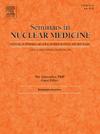[18F]FDG PET/CT放射组学和人工智能在肺癌临床决策中的作用。
IF 5.9
2区 医学
Q1 RADIOLOGY, NUCLEAR MEDICINE & MEDICAL IMAGING
引用次数: 0
摘要
肺癌仍然是全球最普遍的癌症之一,也是癌症相关死亡的主要原因,占所有癌症死亡人数的近五分之一。氟-2-脱氧-d -葡萄糖正电子发射断层扫描/计算机断层扫描([18F]FDG PET/CT)在评估肺癌和控制疾病进展中起着至关重要的作用。传统的PET/CT成像依赖于定性分析和基本的定量参数,而放射组学提供了更先进的方法来分析肿瘤表型。最近,放射组学因其增强FDG PET/CT在各种癌症中的预后和诊断能力的潜力而受到关注[18F]。这篇综述探讨了[18F]FDG PET/ ct放射组学在肺癌,特别是非小细胞肺癌(NSCLC)治疗中的扩展作用,特别是当与人工智能(AI)结合时。我们回顾了放射组学和人工智能如何改善诊断、分期、肿瘤亚型识别和分子标记检测,这些影响治疗决策。此外,我们还解决了临床整合方面的挑战,如成像方案标准化、特征可重复性以及广泛前瞻性研究的需求。最终,放射组学和人工智能有望实现更个性化、更有效的肺癌治疗,有可能改变疾病管理。本文章由计算机程序翻译,如有差异,请以英文原文为准。
Impact of [18F]FDG PET/CT Radiomics and Artificial Intelligence in Clinical Decision Making in Lung Cancer: Its Current Role
Lung cancer remains one of the most prevalent cancers globally and the leading cause of cancer-related deaths, accounting for nearly one-fifth of all cancer fatalities. Fluoro-2-deoxy-D-glucose positron emission tomography/computed tomography ([18F]FDG PET/CT) plays a vital role in assessing lung cancer and managing disease progression. While traditional PET/CT imaging relies on qualitative analysis and basic quantitative parameters, radiomics offers a more advanced approach to analyzing tumor phenotypes.
Recently, radiomics has gained attention for its potential to enhance the prognostic and diagnostic capabilities of [18F]FDG PET/CT in various cancers. This review explores the expanding role of [18F]FDG PET/CT-based radiomics, particularly when integrated with artificial intelligence (AI), in managing lung cancer, especially non-small cell lung cancer (NSCLC).
We review how radiomics and AI improve diagnostics, staging, tumor subtype identification, and molecular marker detection, which influence treatment decisions. Additionally, we address challenges in clinical integration, such as imaging protocol standardization, feature reproducibility, and the need for extensive prospective studies. Ultimately, radiomics and AI hold great promise for enabling more personalized and effective lung cancer treatments, potentially transforming disease management.
求助全文
通过发布文献求助,成功后即可免费获取论文全文。
去求助
来源期刊

Seminars in nuclear medicine
医学-核医学
CiteScore
9.80
自引率
6.10%
发文量
86
审稿时长
14 days
期刊介绍:
Seminars in Nuclear Medicine is the leading review journal in nuclear medicine. Each issue brings you expert reviews and commentary on a single topic as selected by the Editors. The journal contains extensive coverage of the field of nuclear medicine, including PET, SPECT, and other molecular imaging studies, and related imaging studies. Full-color illustrations are used throughout to highlight important findings. Seminars is included in PubMed/Medline, Thomson/ISI, and other major scientific indexes.
 求助内容:
求助内容: 应助结果提醒方式:
应助结果提醒方式:


